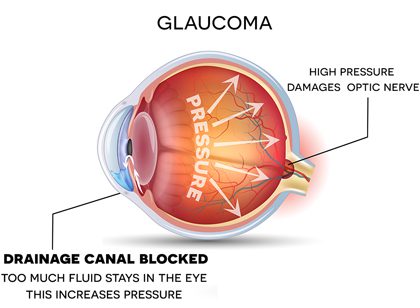What is glaucoma?
Glaucoma is a group of eye diseases that damage the optic nerve. Most forms of glaucoma are associated with high intraocular pressure (IOP), but the disease can also develop in people with normal or low eye pressure.

How does glaucoma affect vision?

The purpose of the optic nerve is to transmit visual signals to the brain. In glaucoma patients, pressure builds inside the eye and gradually causes damage to the optic nerve. This causes the link between the eye and the brain to break over time. If visual information can’t be sent to the brain via the optic nerve, the result is permanent blindness.
Known as the “silent thief of sight,” glaucoma advances slowly over many years. There are typically no warning signs or symptoms of vision loss in people with early stage glaucoma. If the disease is not detected and treated as soon as possible, glaucoma can cause irreversible vision loss.
What are the types of glaucoma?
Open-Angle Glaucoma is the most common form of glaucoma. The disease develops slowly with age and affects the drainage canals in the eye, which become clogged over time. Most people do not notice early symptoms because glaucoma attacks peripheral vision before it affects central vision.
Angle Closure Glaucoma happens suddenly and rapidly, with no warning. It is caused by a buildup of fluid in the eye — the inability for the fluid to drain causes a rapid increase in eye pressure, which has an immediate effect on the optic nerve. Common symptoms include severe eye pain or headaches, sudden loss of vision, blurry eyesight, and nausea. These symptoms may indicate a medical emergency and must be treated immediately to avoid severe vision loss.
Fortunately, prompt laser treatment and medications can clear the fluid blockage and lower eye pressure in people with angle closure glaucoma.
Low or Normal Tension Glaucoma is typically diagnosed when people with normal eye pressure experience optic nerve damage or peripheral vision loss. Unfortunately, there is not enough research to explain what causes damage to the optic nerve if eye pressure is within the normal range.
Congenital Glaucoma is a form of glaucoma in which children are born with a defect in the angle of the eye that interferes with fluid drainage and eye pressure levels.
Secondary Glaucoma occurs as a result of other diseases or medical treatments, such as:
- High blood pressure
- Poorly managed diabetes
- Cataract complications
- Uveitis
- Steroids
Can glaucoma be prevented?
Glaucoma cannot be prevented; however, early detection and treatment can help to control the disease before severe vision loss occurs. For adults over the age of 40, ophthalmologists recommend scheduling an annual comprehensive eye exam that includes pupil dilation. Since glaucoma typically affects peripheral vision first, you may not notice any changes to your prescription, which makes annual exams all the more important. Your doctor will test your vision, check your eye pressure and the condition of your optic nerve during the exam.
Am I at risk for glaucoma?

Glaucoma affects nearly three million Americans. Some groups of people are at a higher risk of developing the disease than others.
It is especially important for these groups to schedule annual eye exams to check for early stages of glaucoma:
- African Americans
- Hispanics/Latinos
- Adults over 60 years old
- Adults with a family history of glaucoma
- Diabetics
How is glaucoma treated?
There is no cure for glaucoma, but its damaging effects can be reduced. The disease is commonly treated by lowering or regulating eye pressure.
Doctors primarily use three different methods to accomplish this:
Medication
Prescription medication is typically the first treatment that eye doctors recommend when treating glaucoma. There are many drugs that work to lower eye pressure, but most doctors prescribe eye drops or pills. Some drugs lower the amount of fluid the eye produces, while others help fluid drain from the eye.
Some patients may experience side effects from glaucoma medication such as eye redness, stinging, or irritation. Discuss the potential for side effects with your doctor — you may need to try several different prescriptions before you find a treatment that you’re comfortable with.
Unless you have a severe allergic reaction, do not stop taking eye drops for glaucoma without consulting your doctor. Discontinuing the use of medication can increase the potential for optic nerve damage and permanent vision loss.
Laser Treatment
Selective Laser Trabeculoplasty (SLT) is often recommended for patients with open-angle glaucoma when eye drops are not effective in lowering eye pressure or if they cause uncomfortable side effects.
SLT is a painless procedure that’s performed in your doctor’s office. A special lens is used to apply an intense beam of light to the drainage system of the eye. This helps stimulate the surrounding eye tissue, so it is more effective at draining fluid and lowering eye pressure levels.
Eye pressure is often significantly reduced as a result of SLT. Many patients are able to eliminate their eye drops or use them less frequently after the procedure. The effects of SLT treatment usually last for 1-5 years and the procedure can be repeated.
Micro-Invasive Glaucoma Surgery (MIGS)
Micro-invasive procedures are proven to be extremely successful at reducing intraocular pressure (IOP) in glaucoma patients, and they involve a much lower degree of risk than traditional surgery.
MIGS procedures utilize one of three approaches:
- Increase fluid outflow using the eye’s drainage system
- Shunt fluid outside the eye
- Decrease the amount of fluid the eye produces
Trabeculectomy Surgery
Trabeculectomy surgery is a traditional approach to reducing eye pressure that has been performed for many years — usually when medical and laser treatments have failed. During surgery, a new channel is created for fluid to drain from the eye and eventually be absorbed by the surrounding tissue.
The procedure is effective in reducing IOP 60-80% of the time. There are, however, risks and complications associated with trabeculotomy surgery such as infection, bleeding inside the eye, vision loss, and low eye pressure.



April is Sports Eye Safety Month, and we're here to remind you that your eyes deserve protection in all of life's games. Whether you're a professional athlete or a weekend warrior, we have the protective solutions to keep you in the clear. 🏈🕶️ #SportsSafety #protectyoureyes #bennetteyeinstitute #lovelife ... See MoreSee Less
0 CommentsComment on Facebook
In celebration of World Health Day, we're shining a light on the integral role of eye health in your overall wellness. Regular eye exams are key to catching not only vision issues early but can also even be the first sign of other health concerns. Schedule your eye exam at any of our seven locations across the islands. 🌎👁️ #WorldHealthDay #eyeexamessentials #bennetteyeinstitute #lovelife ... See MoreSee Less
0 CommentsComment on Facebook
🌑✨ We're gearing up for an awe-inspiring celestial event - we can view a partial solar eclipse across the islands on April 8th! While it's a rare and exciting moment, it's crucial to protect your eyes. Looking directly at the sun, even during an eclipse, can cause permanent eye damage. Use eclipse glasses that meet the ISO 12312-2 international safety standard, consider pinhole projectors as an alternative method for indirect viewing, and remember, regular sunglasses don’t offer sufficient protection against the sun’s rays during an eclipse. 🌌🔭 #SolarEclipse2024 #EyeSafety #EclipseGlasses #ProtectYourEyes #AstronomicalEvent #BennettEyeInstitute #LoveLife ... See MoreSee Less
0 CommentsComment on Facebook
Think eating carrots is the secret to impeccable vision? Guess again! 🥕 We’re all about eye health, but let’s get one thing straight - our dedication to your vision is no laughing matter. Dive into real eye care with us. 🕶️ #AprilFools #NoJoke #EyeHealthMatters #Bennetteyeinstitute #LoveLife ... See MoreSee Less
0 CommentsComment on Facebook
🐰🌼 Hoppy Easter from our practice to all our wonderful patients! Wishing you a joyful and clear-sighted holiday! 🌸👀 #eyecare #happyeaster #visionhealth #bennetteyeinstitute #lovelife ... See MoreSee Less
0 CommentsComment on Facebook
Wave goodbye to winter and embrace the thrill of spring adventures 🌴✈️! Recent findings from RSC highlight a pivotal insight: 50% of adventurers are held back from fully enjoying activities like water sports due to the inconvenience of glasses or contacts. 😎 🏖️ Plus, a significant 55% agree that having clear, unaided vision could profoundly enhance their travel experiences. How much could clear vision transform your adventures? 🌍💬 #ClearVision #AdventureReady #SpringTravels #rscsurvey #bennetteyeinstitute #lovelife ... See MoreSee Less
0 CommentsComment on Facebook